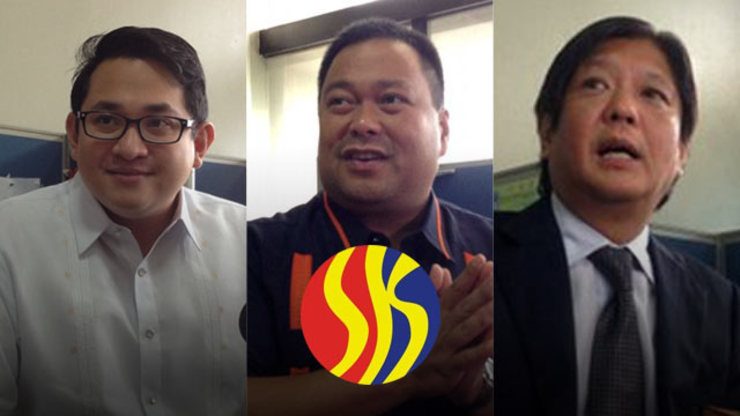SUMMARY
This is AI generated summarization, which may have errors. For context, always refer to the full article.

MANILA, Philippines – Three senators on Wednesday, October 29, urged their colleagues to pass a bill that would institute reforms in the Sangguniang Kabataan (SK or youth council).
In their respective co-sponsorship speeches, Senators Benigno “Bam” Aquino IV, Joseph Victor “JV” Ejercito, and Ferdinand “Bongbong” Marcos Jr pushed for the immediate passage of Senate Bill 2401, also known as the Youth Development and Empowerment Act of 2014, to strengthen youth participation in government.
“It is urgent and important that we reform the SK as a platform for engaging the youth in the grassroots level, and where the youth will be honed to become better and more effective public servants in the future,” said Aquino, chairperson of the Senate committee on youth,
The 3 senators are the co-authors of SB 2401, along with Senators Aquilino Pimentel III and Francis Escudero.
Aquino added that the proposed measure will harness the youth’s potential as a partner in nation-building, and will engage them in transparent and accountable governance. (READ: Why the Sangguniang Kabataan needs an overhaul)
“The Filipino youth have the innate energy, creativity, and innovative ideas to come up with new solutions for age-old problems of the country,” Aquino stressed.
The legislation of much-needed SK reforms was cited as the reason behind the postponement of the SK elections in October 2013, by virtue of Republic Act 10632. The SK polls are currently scheduled for February 21, 2015, but there are moves in the House of Representatives to postpone it again.
List of reforms
In his sponsorship speech, Marcos acknowledged that the current SK system has failed to serve its purpose, but emphasized that his respect and high hopes for the youth remain.
“Youth participation in local governance and in nation-building, as guaranteed by the Constitution, should always be upheld and not to be reduced to just minimal participation,” Marcos said.
Marcos then presented the proposed SK reforms in SB 2401:
- Raising the age bracket of the Katipunan ng Kabataan (or the entire youth electorate) to 15-24 years old, from 15-17
- Raising the age bracket of elected SK officers to 18-24 years old, to address concerns that SK officers in the current system are below the age of majority
- Providing fiscal autonomy to SK, while limiting the use of SK funds to youth development and empowerment purposes only
- Creating in every local government unit a Local Youth Development Council (LYDC), composed of at most two representatives from SK and other accredited youth groups
- Providing a mandatory training program for youth leaders
Marcos said that two other proposals – raising the age bracket ceiling to 30 and keeping the ex-officio seat of the SK federation president in the municipal, city, and provincials council – could still be deliberated upon.
“I am hopeful that the proposed amendments to the Sangguniang Kabataan will usher our youth to a more productive and dynamic participation in governance that will train and guide them to a more mature role of public service,” Marcos said.
Anti-political dynasty clause
Ejercito, in his sponsorship speech, also mentioned a clause in SB 2401 that would prevent the proliferation of political dynasties through the SK.
Section 10 of the bill states that a youth leader who is related to any incumbent elected official within the fourth degree of consanguinity or affinity will be prohibited to seek an SK seat.
Ejercito said that this anti-dynasty clause would end the conflict of interest that youth leaders endure just to appease their political clans.
The 3 senators and former youth leaders are scions of political clans themselves. Marcos and Ejercito are sons of former presidents Ferdinand Marcos and Joseph Estrada, respectively, while Aquino is the cousin of incumbent President Benigno Aquino III.
“I hope, that by having a young Marcos, a young Aquino, and a young Ejercito-Estrada in this legislative effort, we can attain unity among the youth leaders towards this bill,” Ejercito said.
Ejercito also said that efforts to abolish the SK altogether constitute a “betrayal to the Filipino youth.”
“Let’s not lose hope in our youth and the succeeding generations. Let’s strive to provide what is needed for us to develop a new breed of Filipino leaders from the youth sector,” he said. – Rappler.com
Add a comment
How does this make you feel?
There are no comments yet. Add your comment to start the conversation.